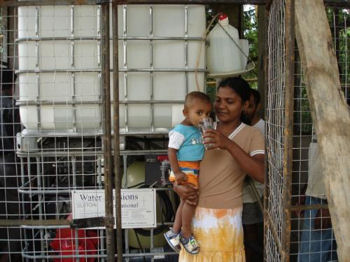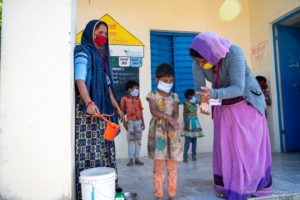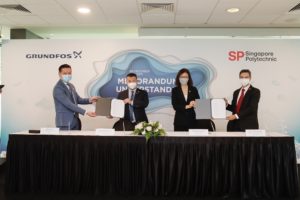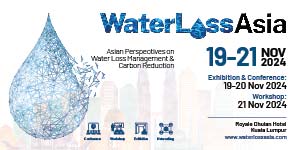Pentair Announces Results of Multi-Year Project Safewater-Colon Research
Pentair, Inc. announced the results of the multi-year Project Safewater-Colon initiative and research, funded by The Pentair Foundation. Project Safewater-Colon demonstrates that it s possible to provide people in developing countries with affordable and sustainable sources of safe drinking water.

billion people lack access to safe water. Visit Pentair s Projectsafewater.com. (PRNewsFoto/Pentair, Inc.)
"Everyone understands that people need clean, safe water to live. The issue becomes proving that a viable, sustainable and cost-effective solution can be provided where it s desperately needed, and we have done that," stated Randall J. Hogan, chairman and chief executive officer of Pentair. "The results of the Project Safewater-Colon study show that for an investment of only pennies a day per person, we can ensure that people have access to safe drinking water in regions where they don t have it now."
More than one billion people around the world, most of them in developing nations, lack access to safe water. The result is that preventable waterborne diseases continue to be a leading cause of illness and death globally. Every day, approximately 25,000 people, mainly children in developing countries, die from preventable waterborne diseases, according to the World Health Organization.
"The world s safe drinking water crisis is solvable," said Hogan. "What we ve learned from Project Safewater-Colon can help address the United Nations Millennium Development Goals."
The U.N. Millennium Goal Number 7C calls for cutting in half the proportion of the world s population without sustainable access to safe drinking water and basic sanitation by 2015.
Establishing an Affordable, Sustainable Solution
In 2006, the Pentair Foundation committed $4.7 million to fund Project Safewater-Colon. The program was conducted in the remote district of Colon, Honduras, where nearly the entire region s approximately 350,000 people lived without clean water and approximately one quarter of them lacked adequate sanitation facilities.
Pentair s Project Safewater-Colon is a comprehensive program that funded the installation of more than 200 water treatment systems and over 10,000 individual sanitation facilities in Colon, which serves approximately 75 percent of the region. Project Safewater-Colon also encompassed widespread community education programs to heighten awareness of the importance of safe, clean drinking water, and the connection between good hygiene practices and health. Additionally, to ensure that safe, treated water continues to be available beyond Pentair s initial funding period, Project Safewater-Colon established a microenterprise business model, where the local community owns the water treatment systems and users pay their communities a nominal fee for potable water. The individual user fee is established by the local community to cover the ongoing operation and maintenance of their system.
Once installed, the system costs less than five cents per person per day to operate.
Water Missions International, a nonprofit organization that addresses the water and sanitation needs of people in developing countries, served as Pentair s on-the-ground partner in Colon.
"Supplying safe water to people in need is an investment in their life, and an opportunity to dramatically reduce the likelihood that their health will be compromised because of the prevalence of waterborne diseases," said Dr. George C. Greene III, chief executive officer of Water Missions International. "Because of Pentair s Project Safewater-Colon, hundreds of thousands of Hondurans now have improved drinking water, health and sanitation conditions."
Research Validates Positive Health Impact
Concurrently, an independent study on Project Safewater-Colon s health impact was led by Dr. Jeffery L. Deal, director of anthropology and water studies for the Center for Global Health, Medical University of South Carolina. The Project Safewater-Colon research program offers an objective study to evaluate and quantify the impact that water purification systems can have on peoples health in a developing country. The research involved the participation and cooperation of the Honduran Department of Health.
The study s methodologies incorporated a combination of ethnographic data, medical chart reviews and immunoassays for three of the most common waterborne protozoan pathogens.
"This is the first time conclusive evidence confirms what many have assumed for years - that access to clean, safe water directly reduces waterborne illnesses," stated Dr. Deal. "In addition, this project has demonstrated that community-based water treatment systems can be done cost-effectively. Our findings provide us with a replicable, immediately deployable model to reduce the incidence of waterborne disease and save lives."
Baseline testing, completed in 2007, identified and evaluated water sources in 613 communities in the district of Colon. The Project Safewater-Colon study measured the water quality in 100 percent of these water sources and found that high counts of coliform bacteria, indicative of fecal contamination, were present in every water source.
The Project Safewater-Colon study measured waterborne illness rates among three groups of participants:
- The Control Group - no water treatment system, no sanitary system and no community education programming;
- The Water Only Group - water treatment system had been operational for one full year, no sanitary system and included community education programming; and
- The Water and Sanitation Group - water treatment system had been operational for one full year, sanitary system had been completed and community education programming had been implemented.
Final data compiled in 2010 demonstrated a significant difference between those who received access to treated water, sanitation and education, and those in the control group who did not. In fact, the results showed that only 4.5 percent of the water only group tested positive for parasites and 3.8 percent of the water and sanitation group tested positive for parasites, compared to 25.0 percent for the control group, resulting in an 80 percent improvement.
Additionally, medical records from four Colon health clinics pointed to a decline of 50 percent in the number of diarrhea disease cases they encountered once Project Safewater-Colon was fully operational, following a 34-month post-installation timeframe.
"Data gathered following the installation of water treatment and sanitation systems, and community education, now suggests a high level of understanding of the causes and prevention of waterborne illness or disease among people in the communities studied," said Dr. Deal.
Source: Pentair plc.







